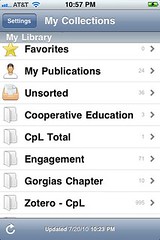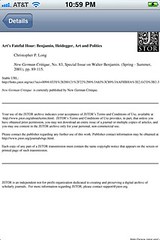I am happy to report that Mendeley has developed an iPhone app that brings us a step closer to the digital research model I hope to implement in the months to come.
Before I mention a few of the limitations of the application, I want to celebrate its very appearance. This is a huge step forward in mobile bibliographic and reference computing.
About three years ago, I had a phone conversation with a person in the sales department at Thomson Reuters, the company that makes Endnote. The purpose of my call was to see if they were developing a version of Endnote for the recently released iPhone. They told me that they did have plans, once Apple released the Software Development Kit, to develop a mobile version of Endnote. Already at that point, I could see the value of having my references so easily accessible.
Although that application has yet to materialize, I shifted, in the meantime, to Zotero because it facilitated the sort of collaborative research I hoped to put into practice with my students. As I mentioned in my previous posts on digital research more generally and on the way I use of Zotero in particular, a significant limitation to all the bibliographic software was the inability to use anything other than the web browser to interface with my reference libraries when using my iPhone and iPad.
I turned to Mendeley in the hope that I would find an application that would have all the collaborative functionality I required even as it allowed me to organize, read and annotate pdf files in a way that would integrate with my word processing software. I am very happy with Mendeley when I am sitting in front of a desktop computer. However, it is critical to the model of digital research I am trying to establish that all my references be accessible to me on all my devices wherever I am.
This is where the new iPhone application, even if it is tantalizingly labeled ‘Lite’, adds substantive value to my research workflow. The application syncs with my Mendeley libraries beautifully and allows me to read any of the pdf files I have posted to it. In the photo on the right, you can see the collections exactly as they appear in the Mendeley Desktop application and on the web.




That’s awesome to hear, Christopher! You’re correct that a Pro version is on the way and I’d also like to let you know that work on porting the iphone app to the ipad had already begun.
(you’ve been waiting for three years? Now I see where the name of your blog comes from! 😉 )
Thanks @mrgunn for the heads up on the Pro version and the news about the iPad app. Things seem to be rolling along there at Mendeley. Nice work.
Hi Christopher – thanks for a good review of a space that is certainly picking up in pace!
I am one of the people behind Qiqqa.com so would love to draw your attention to both Qiqqa (on the PC) and Papers (on the Mac), both of which offer (and have for a while) the ability to synchronise your PDF library between your desktop machines and an Internet-based library that allows reading of your papers on the iPhone (and any other phone that supports PDFs).
I am very interested in hearing your ideas on your model of digital research! Have you blogged or published anywhere about what you would like from the research tools on the market?
Have a great week!
Jimme ([email protected] or http://www.qiqqa.com)
Thanks, Jimmie, for responding. While I have not played at all with Qiqqa for the PC, I have played with Papers and mentioned it briefly in my post on Integrating Mendeley in the Research Circle.
There I argued that Papers lacked the bibliographic integration I needed. It is not only that it does not allow me to collect the complete bibliographic information for each document, but also that it does not plug into a word processing program to complete the research circle.
I did write about what I would like to see from digital research tools in my post Closing the Digital Research Circle. There I envisioned a single program that would allow me to download files, collect bibliographic information about articles and monographs, read documents, take notes, annotate pdfs, and cite references in the word processing program of my choice. I wanted all my reference libraries to be accessible and my documents to be able to be annotated on all my devices.
It may be that Papers has added features since I investigated it in June, but when I tried it, it did not have the rich bibliographic features I require. My disappointment with Papers at the time led me to Mendeley.
I'm a little curious about how the app has come along after two years. I have to admit though that I'd be very surprised if it didn't live up to its potential.
In the end, I am very happy to see the first iteration of this mobile reference resource. I look forward to the updates and to the "Pro" version, if indeed, that is the direction toward which the label "Lite" is gesturing.
social media marketing plan
I'm a little inquisitive about how the app has come along after two decades. I have to confess though that I'd be very amazed if it didn't stay up to its prospective.
South beach cigarettes
Thanks to Mendeley for developing the nice app. Hope Mendeley will recover the limitations soon.
I'm a little inquisitive about how the app has come along after two decades. I have to confess though that I'd be very amazed if it didn't stay up to its prospective.
Good and great inventions are always a part of our life and i really like such kind of technologies. if you people want to have such kind of info u can also visit Comparison Prices Online. i hope it will help you a lot.There is lot of info about I phone just visit this.